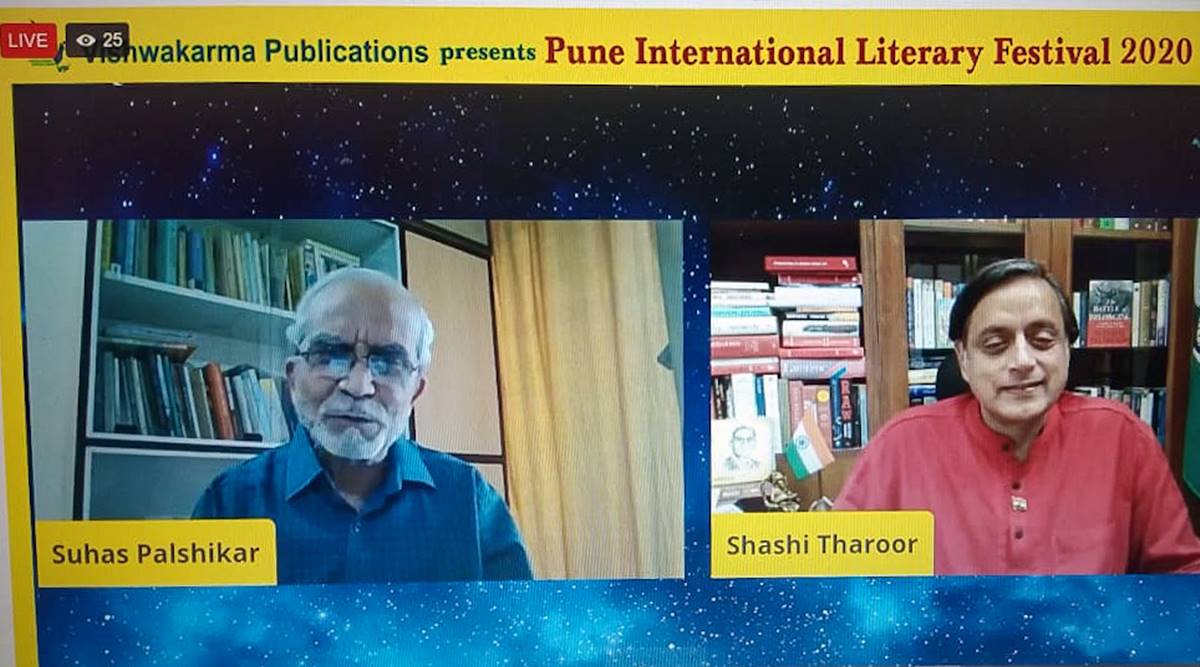 Shashi Tharoor in conversation with political scientist Suhas Palshikar about his latest book, ‘The Battle of Belonging’, at the 8th Pune International Literature Festival on Friday.
Shashi Tharoor in conversation with political scientist Suhas Palshikar about his latest book, ‘The Battle of Belonging’, at the 8th Pune International Literature Festival on Friday.Congress leader Shashi Tharoor believes it is the response of the many that shows that there is a capacity to experience and feel sorrow within the parameters of national Indian identity.
“I would like to still think there is a spirit of solidarity in the country,” said Tharoor, when asked by political scientist Suhas Palshikar about nationalism as defined by Ernest Renan, which also means sharing others’ sorrow.
He was speaking in an online conversation about his latest book, ‘The Battle of Belonging’ at the 8th Pune International Literature Festival on Friday.
“The classic instance is that of the migrant workers’ situation. For middle-class India, these are people they have associated with on a day-to-day basis, like domestic workers, vendors and factory workers…when suddenly the lockdown happened, these people…started their long trudge back to the villages they had come from. The entire nation’s imagination was seized with the realisation that these fellow citizens of ours were suffering…but their suffering was a reminder to us of our shared obligations to them. It is the response of many that shows that there is a capacity to experience and feel sorrow within the parameters of our national Indian Identity,” said Tharoor.
That was a terrific conversation on the issues that matter. Thank you @PalshikarSuhas & #PuneLitFest!#TheBattleOfBelonging pic.twitter.com/EA8NALh0Wf
— Shashi Tharoor (@ShashiTharoor) December 11, 2020
Asked to elaborate on some thoughts in his new book, in which he says that it is the duty of the citizen to be a nuisance to the government, facilitated by democracy, and if that capacity is not facilitated then the citizens are pushed to become docile, Tharoor said, “I express my mounting concern over delegitimization of dissent by our government and as a result of that the increasing pressure on people to conform rather than be a nuisance. Only a handful have taken upon themselves as their civic duty to challenge, question and criticise the decisions taken in our name. But many have concluded that because of the current government’s active dislike and rejection of disagreement, they would rather be conformist than challenge at the cost of themselves. The result of which is the hollowing out of the institutions that in theory were designed to be independent or autonomous, which in turn will reduce the capacity of being a democratic nuisance.”
He said it has become easier to dispose of individuals and that there is an “alarming erosion of democracy and institutional autonomy” with a greater direction of conformity, as people realise there is a price to pay for exercising the democratic right to be a nuisance against the government.
With the argument of nationhood and nationalism in the book, Tharoor explored how anti-colonial nationalism later became civic nationalism as enshrined in the Constitution, why nationalism of the Constitution is civic nationalism with equal rights to all and how Hindutva counters it.
“The common criticism that Vinayak Damodar Savarkar, M S Golwalkar and Deendayal Upadhyaya shared at the time was that the Constitution seemed to assume that the nation called India is a territory called India and the Constitution is for all people on it. They said that the nation is not a territory, the nation is of people and the people of India are the Hindu people. That was the crystallisation of the argument for Hindu Rashtra…you now have a very unusual situation where the very Prime Minister upholds the secular Constitution, pluralism and civic nationalism, embodies and breeds an idea of an Indian nationhood that is fundamentally opposed to the implications of our Constitution and that is, I believe, the real disagreement…”
Defining patriotism and nationalism, Tharoor said that while the former means loving your country because you belong to it and it belongs to you, nationalism, as it is being promoted by the ruling party, is a totalising vision that excludes those who do not subscribe to it.
“A patriot may be prepared to die for his country, a nationalist is ready to kill for his state, which brings the important distinction. Civic nationalism is not anchored to the identity of any ethnic markers but in Constitution and institutions where all citizens are treated equally. The nationalism that I describe led to the long successful struggle for Independence…”